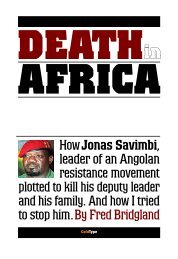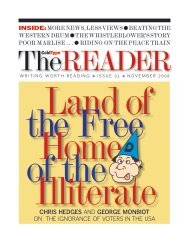UPDATED - ColdType
UPDATED - ColdType
UPDATED - ColdType
- TAGS
- updated
- coldtype
- coldtype.net
Create successful ePaper yourself
Turn your PDF publications into a flip-book with our unique Google optimized e-Paper software.
State of the Union address, it was used anyway. A<br />
media storm ensued only to be doused when the<br />
president “accepted responsibility” and promptly<br />
went on vacation. Throughout this controversy,<br />
his supporters in the press and the Congress<br />
were arguing that the weapons issue was never<br />
all that important. Thomas Friedman in The New<br />
York Times was now scolding the Administration<br />
for raising the weapons issue in the first place<br />
since Iraq, in his view, was always a “war of<br />
choice,” not necessity. The rationales began to<br />
shift like sand in the Arabian Desert.<br />
THE FCC BACKGROUND BECOMES<br />
THE FOREGROUND<br />
DURING the war, media companies were lobbying<br />
the FCC for regulatory concessions while at<br />
the same time downplaying and barely covering<br />
the FCC issue. Yet, thanks to brilliant grass roots<br />
organizing, the issue mushroomed in importance.<br />
More than a million people wrote the FCC<br />
or their legislators opposing pro-industry rule<br />
changes voted June 2. This is unprecedented.<br />
Conservative and liberal groups made common<br />
cause. The result: Congress voted 400-21 against<br />
the Bush Administration policy, prompting a<br />
threat of a veto.<br />
Washington Post media writer Howard Kurtz<br />
was startled by the response. “Nobody much<br />
likes Big Media these days,” he wrote. “But who<br />
woulda thunk that it would become a hot political<br />
issue? Not me … this issue has struck some<br />
kind of nerve.”<br />
New York Magazine’s Michael Wolff went further<br />
in suggesting that there is a wave of revulsion<br />
building against the media itself, as well as<br />
the FCC. He told me in an interview: “We’re all<br />
WHAT CAN WE DO ABOUT IT?<br />
253<br />
media consumers. It stinks and nobody’s happy.<br />
Nobody can find what they want. Nobody is<br />
pleased … there are so many people who work<br />
in the media business and those people are also<br />
saying this stinks. These companies that we<br />
work for don’t work anymore. They’re dysfunctional<br />
because they’re too large and now you<br />
want to make them bigger?”<br />
The public has yet to turn against the media<br />
for its propagandistic coverage but a wave of<br />
scrutiny had finally begun. At last, the coverage<br />
of the wars seemed to be striking a nerve, too,<br />
within parts of the media world.<br />
In England, the BBC coverage of the Blair government’s<br />
dossier justifying the war became<br />
embroiled in controversy with top government<br />
officials and members of Parliament denouncing<br />
its reporting. When the BBC’s principal source<br />
of information, weapons expert David Kelly committed<br />
suicide under intense pressure from the<br />
government, the story dominated the headlines.<br />
In retaliation, there were calls by Tony Blair’s<br />
supporters for regulatory supervision of the BBC<br />
by a new FCC-type commission called OFCOM.<br />
While the Beeb defended its impartiality, a Cardiff<br />
University study on its war coverage was released<br />
documenting not an anti-war bias but a pro-government<br />
tilt in much of its coverage.<br />
JOURNALISTS DEBATE<br />
JOURNALISTS on both sides of the Atlantic<br />
began debating the coverage and speaking out. I<br />
covered two conferences dealing with the issues<br />
raised in this book. One in England was sponsored<br />
by Reporting The World. Another, in New<br />
York, was co-sponsored by The Guardian and<br />
New York Magazine.

















